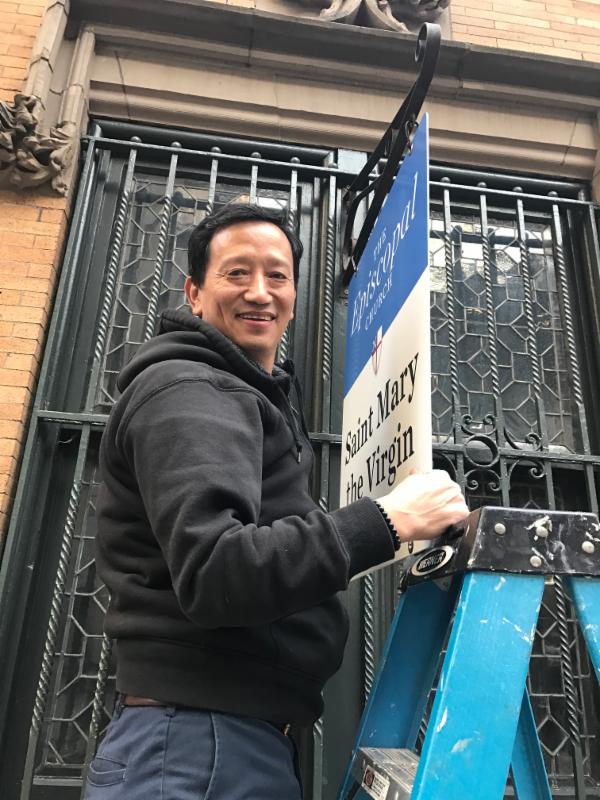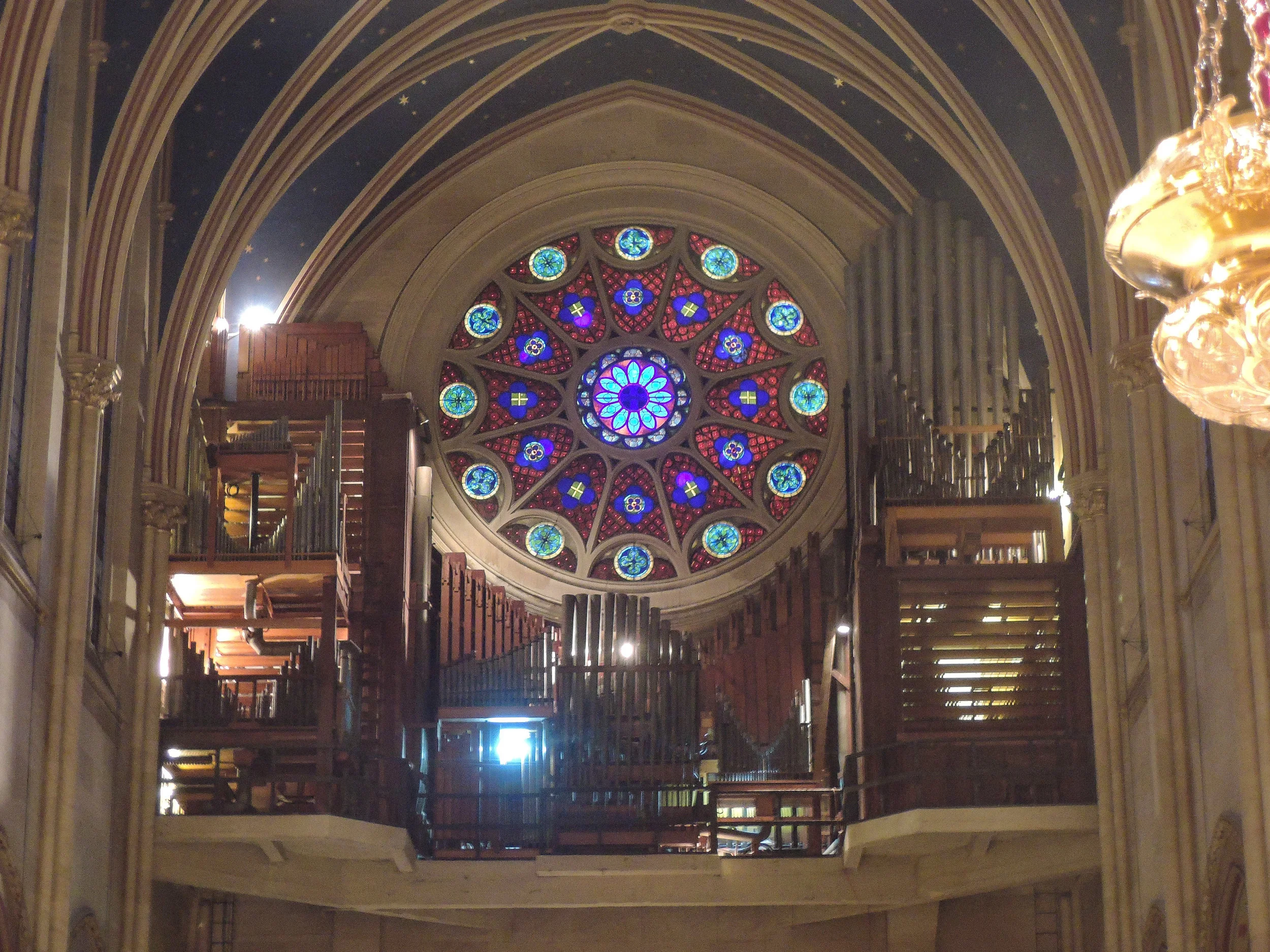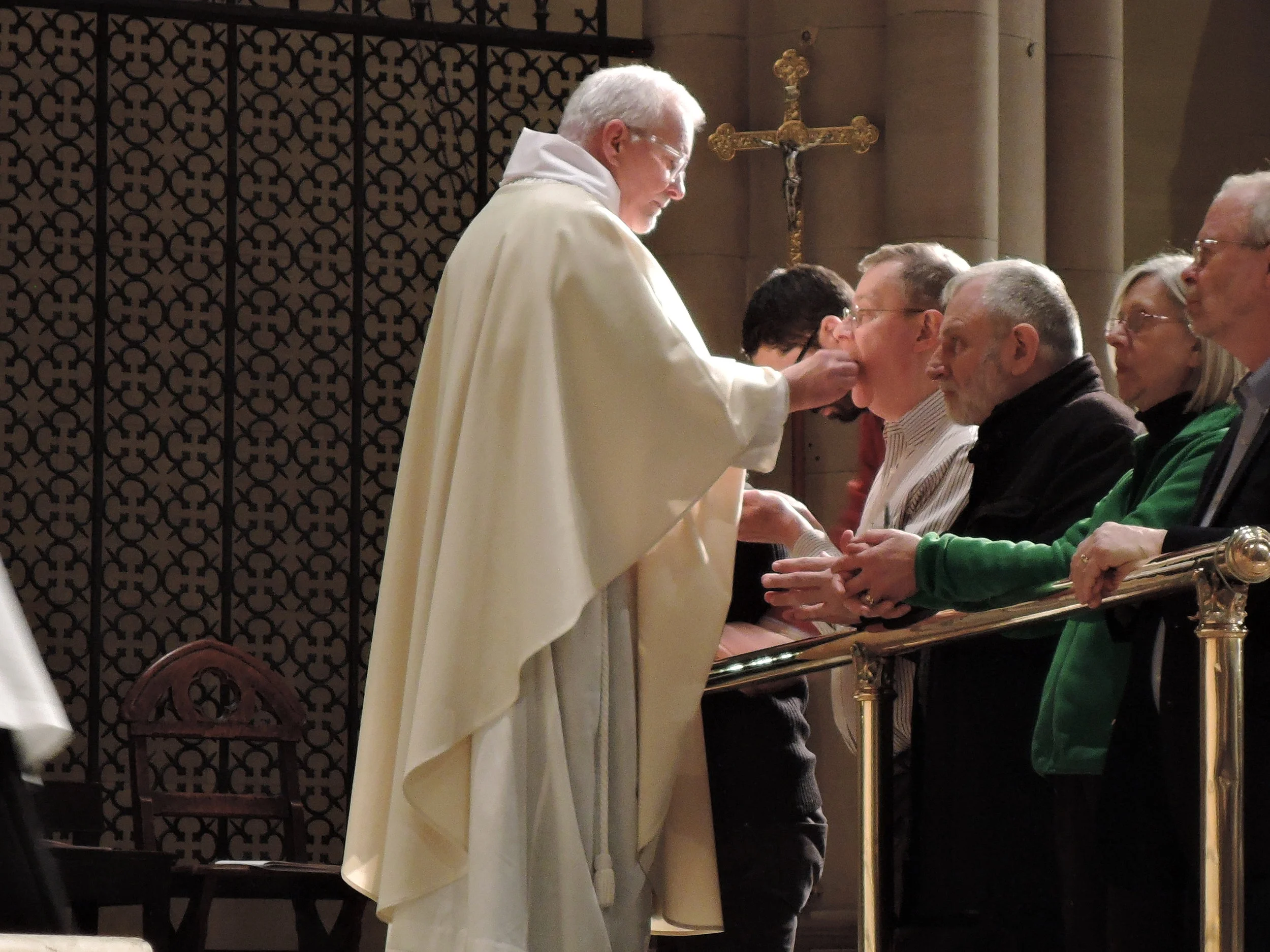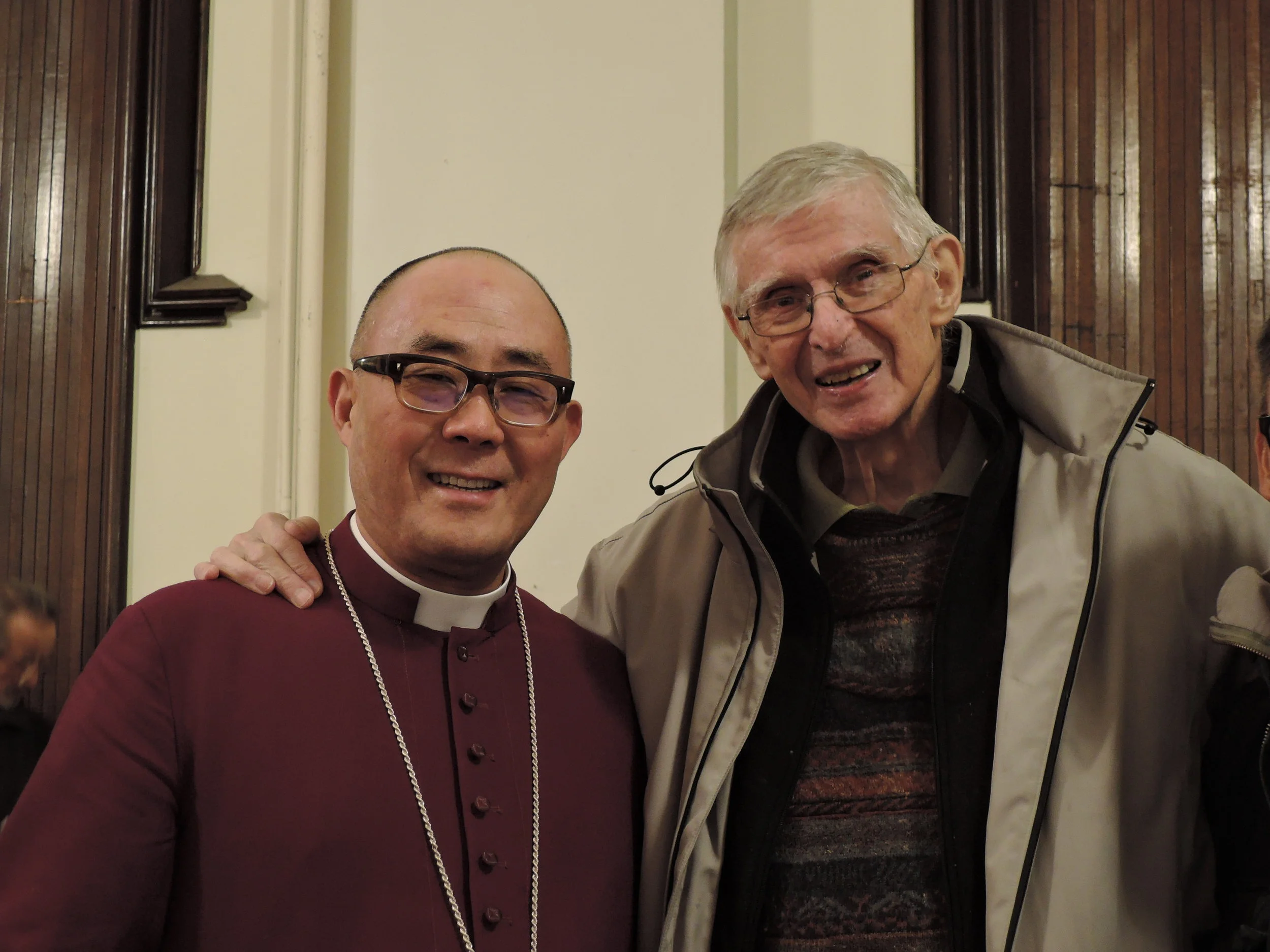The Angelus: Our Newsletter
VOLUME 19, NUMBER 18

FROM THE RECTOR: A JOYFUL WEEKEND
We have two celebrations this weekend. Each can lay claim, respectively, to a Greek or Latin verb for the command, "Rejoice!" On Annunciation Eve, Friday, March 24, Gabriel's greeting to Mary in New Testament Greek, chaîre, can be translated as "Hail!" (Revised Standard Version), "Greetings" (New Revised Standard Versions), or by its very common, even ordinary, imperative sense, "Rejoice." Count me as one who can easily imagine the word carrying the sense of greeting and rejoicing as God's messenger speaks to the young woman God has chosen to be the mother of his son (Luke 1:28). You'll hear this gospel at the Solemn Mass on Friday night and at the 12:10 PM Eucharist on Saturday.
Read MoreVOLUME 19, NUMBER 17

FROM FATHER SMITH:
TRAINING FOR THE KINGDOM
Julie Sandri died on December 20, 2016, after a year-long and very courageous battle with pancreatic cancer. Julie was a parishioner, who almost always attended the 9:00 AM Mass on Sunday mornings, and she was well-known among that small community of friends and parishioners who gather at that early hour to celebrate the Holy Eucharist together. Julie was many things--a Christian, a mother, a teacher, an artist, a potter, a friend, a Saint Marian, and a fiercely loyal, though not native, New Yorker. She was also, and very happily so, a resident of this neighborhood. For many years, Julie lived in a great apartment on Seventh Avenue, just south of Carnegie Hall. The apartment had a number of highly desirable features, including many windows and great light, not so common in Manhattan apartments.
Read MoreVOLUME 19, NUMBER 16

ANNOUNCEMENT: SMOKELESS NO MORE
All of the new fixtures are not in, but on Sunday, March 12, 2017, incense will return. The smoke room has been out of commission since a very small fire on Sunday, January 22, 2017. Great thanks go to architect and parishioner José Vidal and to office manager Chris Howatt for getting the job done.
FROM THE RECTOR: GOVERNANCE
Read MoreVOLUME 19, NUMBER 15

The rite of imposition of ashes on the first day of Lent, when Jesus' words in Matthew about not showing any sign that one is fasting are still hanging in the air, is not the only scriptural contradiction that has come down to us for Lent. In their book Liturgy for Living (1979), Charles P. Price (1920-1999) and Louis Weil wrote, "For as long as we have records, the passage read as the Gospel for the First Sunday in Lent has been the account of Jesus' temptations" (page 230). Yet Jesus' encounter with Satan happens immediately after, not before, his baptism.
Read MoreVOLUME 19, NUMBER 14

The big news for the coming week is the beginning of Lent on Wednesday, March 1. That said, I want to begin by looking at Sunday, now called, "The Last Sunday after the Epiphany." In earlier Prayer Books it was, "The Sunday called Quinquagesima, or the Sunday next before Lent." Quinquagesima-from the Latin for fiftieth-is exactly fifty days from Easter Day.
Read MoreVOLUME 19, NUMBER 13

FROM THE RECTOR: ISHMAEL
There's more to the story of Ishmael than the famous opening sentence of Herman Melville's Moby-Dick. But I don't think Melville's use of Ishmael's name was fair. Ishmael was not the child of the covenant-though Genesis notes Ishmael was thirteen years old when he, along with his father and all of the enslaved males belonging to Abraham were circumcised (Genesis 17:23-27). "Ishmael" means "God hears" (Genesis 16:11). He, like Isaac, was a child of promise.
Read MoreVOLUME 19, NUMBER 12

FROM THE RECTOR: A BIBLICAL FAMILY
Abram, later Abraham, makes his first appearance in Genesis in a list of the descendants of Noah's oldest son, Shem (Genesis 11:26). We've been hearing Abraham's story at Evening Prayer since the second Friday after the Epiphany, this year, January 20. A few years ago I discovered that the Daily Office Lectionary omitted the passage where Abraham's two sons, half-brothers Ishmael and Isaac, come together to bury him (Genesis 25:9). I also discovered that the only other time they are found together is after Isaac is born. Isaac's mother Sarah sees them playing together. She reacts by insisting that Abraham send Ishmael and his enslaved mother Hagar away. Neither Sarah nor Abraham come off very well in this story. Yet sending Hagar and Ishmael away opens the door for God to rescue them when they are near death in the wilderness.
Read MoreVOLUME 19, NUMBER 11

FROM THE RECTOR: THE PSALTER
Over the years, through the grace of knowing some generous priests who were retiring and reducing their libraries, I have acquired all but one in the series of Prayer Book Studies done to prepare for the Draft Proposed Book of Common Prayer (1976). The series started in 1950 with a single volume. It included the first two studies: I Baptism and Confirmation and II The Liturgical Lectionary. There's a lot to be learned from the series about the present Prayer Book and about the shape of liturgical studies of their time.
Read MoreVOLUME 19, NUMBER 10

FROM THE RECTOR: SMOKELESS MARY'S
On Sunday, January 22, after Evensong, thurifer Ric Miranda was burning off the residue in the removable metal cup that holds the charcoal inside the thurible. The soot or residue on one of the blades of the exhaust fan caught on fire. Because of his background, Ric knew how to deal with the fire directly and quickly. At his suggestion, the Fire Department was called to make sure the fire was entirely out-no residual smoldering particles to set something else on fire. Until we have a new exhaust system and the right kind of fire protection system in the smoke room, our prayers will rise to God without incense.
VOLUME 19, NUMBER 9

Joseph, the one with the coat of many colors, and his family were not the first Hebrews to sojourn in Egypt. After God led Abram, later Abraham, to leave his father's land to go to Canaan, there was a famine. So, he headed to Egypt. As they entered that country, he told Sarai, later Sarah, his wife and half-sister, to say to the Egyptians that she was his sister, but not his wife (Genesis 12:10-20). Later, Abraham does this again with other people. The second time, Sarah will be spared sexual relations (Genesis 20:1-18).
On Saturday, January 21, 2017, the eve of the Third Sunday after the Epiphany, we will hear the first of these two stories. The Daily Office Lectionary omits the second.
Read MoreVOLUME 19, NUMBER 8

FROM THE RECTOR: A CLERICAL UNITY
On December 7, 2016, I was the celebrant for the Wednesday 12:10 Sung Mass. It's the day the church commemorates the life and witness of Ambrose, bishop of Milan, who died in 397. Preparing for a brief homily, I was surprised and appalled to discover that the date of his commemoration had shifted with the 1979 Prayer Book from the date of his death to the date of his ordination as bishop. He died on Easter Eve, April 4, 397.
Read MoreVOLUME 19, NUMBER 7

FROM THE RECTOR: CLOSED DOORS
While making two pastoral visits early last Friday afternoon, I walked by one Orthodox cathedral and four Protestant churches. The doors of all five were closed. Two of the churches were Episcopal parishes, the others were a Presbyterian and a Hungarian Reformed congregation. The cathedral was Greek Orthodox. These days many churches are simply not able to keep their doors open throughout the day; and so I can think of no more important ministry for us than the witness and opportunities our open doors offer. Our doors are open not just for ourselves, but also and always for others.
Read MoreVOLUME 19, NUMBER 6

FROM THE DEACON: BREAK AHEAD
The above title sounds like a highway sign, but those usually tell exactly what's around the bend, while our life journeys rarely imitate that prescience, that certainty.
When we worship at Saint Mary's we profess a willingness to open ourselves to something mysterious, to the opposite of certainty: faith. We may be afraid to surrender to God guiding us when we can't see the next steps clearly, but Paul reminds us that, "we look not to the things that are seen but to the things that are unseen" (2 Corinthians 4:18). In November I wrote about, "Time Away & Back Again." It's perhaps an apt description of a new phase-how I'll deal with some realities of my life in New York City and subsequently at Saint Mary's.
Read More